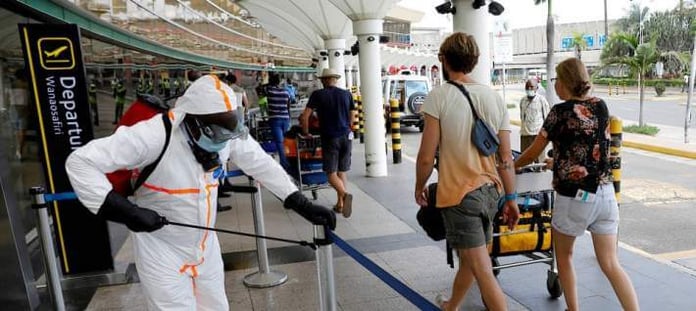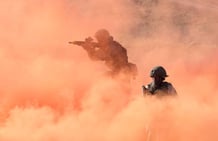
FOR Mali’s Prime Minister Boubou Cisse is about nothing less than “the survival of the nation.” On Sunday, a new parliament is to be elected in the West African state with just under 20 million inhabitants. Business as usual despite terror and corona? The president and prime minister brushed aside doubts about the meaning. Surveys indicate a turnout of just 20 percent.
People are afraid of the Islamists and they are afraid of the Coronavirus. For a long time, Mali was one of the few countries worldwide without a single confirmed case of Sars-CoV-2. The first two cases were reported last Wednesday. Even though the official figures in Africa are still low – around 3000 cases have been registered across the continent – the apocalyptic images from Europe are effective. When voting in Mali on Sunday, most people will probably stay in their homes.
Like many other African countries, Mali has now imposed a curfew at night in the fight against the coronavirus. Economic life in the bitterly poor state has come to a standstill. The population is taking the measures hard. The average income is just over $ 900 a year. Large parts of the country are controlled by bandits, tribal militias or jihadists. More than 215,000 internally displaced people wander through the country. Islamist attacks have been increasing recently. A collapse of the already weak economy could plunge the country completely into the abyss, observers fear.
An economist warns of violent unrest and hunger as a result of fighting corona
Due to a lack of tests, the coronavirus could be more widespread in Africa than the official figures suggest. Nevertheless, South African Seán Mfundza Muller wrote in a highly regarded essay about the measures that are now being taken: “Medicine could be more devastating than the disease.” Muller is a lecturer at the Public and Environmental Economics Research Center at the University of Johannesburg. “History shows that economic shocks are driving up the mortality rate,” said the economist. He warns of violent social unrest and hunger and says: “Poverty also kills.”
In South Africa, with 927 confirmed corona cases the most affected African country, the “total lockdown” should begin at midnight this Friday. Until April 16, people are only allowed to go on the streets for practically doctor visits or shopping. Military patrol. The coming days will be crucial, President Cyril Ramaphosa said on television: “Without drastic measures, the number of people infected will quickly increase: from a few hundred to tens of thousands, and within a few weeks there will be hundreds of thousands.” That is “extremely dangerous” in particular for a country like South Africa, “in which many people have an immune system weakened by tuberculosis and HIV, poverty and malnutrition”.
Other African countries also reacted violently to the looming danger. In Nigeria, a country with 200 million inhabitants and 65 confirmed corona cases, the military is currently preparing to forcefully transport infected people to hospitals if necessary. It is forgotten that the West African state has been suffering from the spread of hemorrhagic Lassa fever for years. Between 2015 and 2019, the number of people infected with the deadly virus rose sharply, from 56 in 2015 to 810 in the previous year. And by mid-March 2020 alone, 774 new Lassa cases had been reported, 132 people had died. With the restriction of international travel, less and less urgently needed medicines and medical professionals are now reaching the country. Even the World Health Organization’s emergency aid experts are stuck in their Africa headquarters in Congo-Brazzaville. Laboratory materials and protective clothing cannot be distributed.
A curfew was imposed in Rwanda on March 22. The security forces in the dictatorial state in East Africa take President Paul Kagame’s instructions seriously: According to media reports, two people were shot dead on Wednesday because they violated the curfew and fought in public. Rwanda has also closed the borders with neighboring countries. Congo is particularly affected. Militias are raging in the east of the country, and an Ebola epidemic has only just ended. The metropolitan cities of Bukavu and Goma, which are located directly on the border with Rwanda, are dependent on deliveries from the neighboring country. But now everything is still. The measures taken to curb the spread of the coronavirus exceed those
Kenya no longer receives pesticides to combat the locust plague
It doesn’t look much better in Kenya. The East African country is currently struggling with a locust plague. Huge swarms passed through the country and destroyed the harvest. At the moment the animals are hatching the third generation. Kenya urgently needs pesticides to combat them. But now the supplies run out. At the airport in the capital, Nairobi, the Kenya Airways aircraft are lined up. Nothing works anymore. Only now and then does a plane take off for a domestic flight.
The taxi driver Triza Mukami, 38 years old, has her regular seat at the airport and has had no sales for days. There are strict laws in Kenya. Those who infect others with the coronavirus face the equivalent of around 260 euros in penalty or three years in prison. Drivers have to disinfect their cars, otherwise, they pay the equivalent of around 350 euros. But there are no more customers. Travelers from high-risk countries like Germany have not been allowed to enter the country for two weeks. Kenya has now extended its regulations to all visitors from countries where there have been corona cases. The tourist hotels in the national parks or along the coast are also deserted.
Now the single mother Mukami doesn’t know how to feed her seven-year-old daughter. If things go well, she earns around 450 euros a month, about half of which she needs for rent, electricity, and water. “We commit suicide for fear of death,” she says, “hopefully this nightmare will end soon.” In Kenya, average life expectancy rose from 41 to 67 years between 1950 and today. “We owe this development to prosperity and growth,” says Mukami, “we are currently putting all of this at risk.”
All new Bundeswehr soldiers relocated to Mali have to be in quarantine for two weeks
The United Nations estimates that Africa needs a $ 100 billion stimulus to cushion the economic consequences of the corona pandemic. Countries like Ethiopia have long been calling for a haircut. It is certain that the continent, home to around two-thirds of the world’s poor, is slipping into recession. At the beginning of the month, the growth forecast was revised downwards from 3.2 percent to 1.8 percent. Africa’s economy is likely to fall even lower.
There are still more than 1,000 German soldiers in the Mali combat area. You are part of a UN peacekeeping mission. In April the change of the Bundeswehr contingent should take place every four months. It is likely to be delayed. “All soldiers who land new in Mali spend the first two weeks in quarantine,” said the German army spokesman Alexander Gottschalk.













